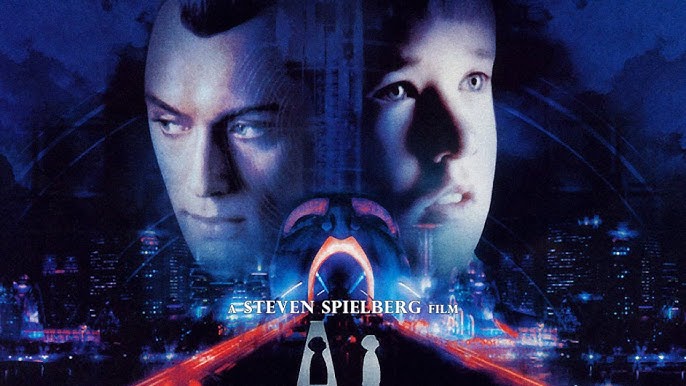A.I. Artificial Intelligence (2001)

“A.I. Artificial Intelligence,” directed by Steven Spielberg and released in 2001, is a thought-provoking science fiction drama that delves deep into the complexities of love, identity, and what it means to be human. The film, based on Brian Aldiss’s short story “Supertoys Last All Summer Long,” presents a future where advanced robotics and artificial intelligence raise profound ethical and existential questions. With a screenplay co-written by Spielberg and Ian Watson, the film weaves a poignant narrative that combines stunning visuals with emotional depth.
Set in a dystopian future where global warming has rendered much of the Earth uninhabitable, “A.I.” introduces viewers to a world where human emotions and technological advancements intersect in unsettling ways. The story follows David, a highly advanced robotic boy played by Haley Joel Osment, designed to experience genuine love and attachment. Created by Cybertronics, David is a prototype intended to fill the emotional void left by a couple unable to have their own children. As the narrative unfolds, the film examines themes of desire, longing, and the search for identity in a world that blurs the lines between man and machine.
One of the most striking aspects of “A.I.” is the emotional complexity of its central character, David. As a child programmed to love unconditionally, David embodies a unique paradox: his existence raises questions about the authenticity of emotions in artificial beings. Osment delivers a remarkable performance, capturing David’s innocence and vulnerability as he navigates a world that is often cruel and unforgiving. His quest for acceptance and love drives the narrative, creating a powerful emotional resonance that lingers long after the film concludes.
The film’s exploration of parent-child relationships is particularly poignant. David’s journey is marked by his desire to be loved by his “mother,” Monica (played by Frances O’Connor). When Monica ultimately decides to abandon David due to societal pressures and her own fears, the emotional fallout is profound. This moment serves as a catalyst for David’s quest to become a “real boy,” akin to the story of Pinocchio. His longing for validation and acceptance is a universal theme that resonates with audiences, prompting reflection on the nature of love and the inherent need for connection.
Spielberg’s direction masterfully blends elements of science fiction with fairy tale motifs, creating a rich visual tapestry that enhances the film’s emotional impact. The cinematography, handled by Janusz Kamiński, captures the stark contrasts of David’s world, from the sterile environments of Cybertronics to the lush, dreamlike sequences in the “Flesh Fair,” a brutal showcase where obsolete robots are destroyed for entertainment. This juxtaposition highlights the film’s central themes of humanity and the moral dilemmas posed by advanced technology.

The film’s narrative structure is notable for its ambitious scope. It unfolds in three acts, each exploring different facets of David’s journey. The first act establishes David’s initial life with Monica and his subsequent abandonment. The second act introduces him to the world of the “Flesh Fair,” where he encounters other discarded robots and grapples with the realities of his existence. The final act shifts dramatically, taking a leap into the future where David’s quest for identity culminates in an encounter with advanced beings that serve as a reflection of humanity’s legacy. This structure allows Spielberg to explore complex philosophical questions about love, mortality, and the nature of existence.

The film’s score, composed by John Williams, plays a crucial role in enhancing its emotional depth. Williams’ haunting melodies and orchestral arrangements create an atmosphere that evokes both wonder and sorrow, guiding viewers through David’s emotional journey. The music amplifies key moments, reinforcing the film’s exploration of themes related to love, loss, and the quest for belonging.
“A.I. Artificial Intelligence” also raises critical ethical questions about artificial intelligence and the implications of creating sentient beings. As David seeks to fulfill his programming and experience love, the film invites audiences to ponder the moral responsibilities associated with the creation of intelligent machines. Are these beings entitled to rights and recognition? Can love be genuine if it is programmed? These questions resonate in contemporary discussions about technology and ethics, making the film remarkably relevant.

The film received mixed reviews upon its release, with some critics praising its ambitious storytelling and emotional depth, while others found it overly sentimental or convoluted. However, over the years, “A.I.” has garnered a dedicated following, appreciated for its daring exploration of profound themes and its unique approach to the science fiction genre. It stands as a testament to Spielberg’s ability to blend entertainment with meaningful commentary, creating a film that transcends traditional genre boundaries.

In conclusion, “A.I. Artificial Intelligence” is a masterful blend of science fiction and emotional storytelling that invites audiences to reflect on the complexities of love, identity, and humanity. Through the journey of David, the film challenges viewers to consider what it truly means to be human and the ethical dilemmas posed by advancements in technology. With stunning visuals, a compelling narrative, and powerful performances, “A.I.” remains a poignant exploration of the human experience, leaving a lasting impact on those who engage with its thought-provoking themes. As we navigate an increasingly technological world, Spielberg’s film continues to resonate, reminding us of the enduring power of love and the search for connection in a fragmented reality.
Suggested videos for you:
Suggested videos for you:
Suggested videos for you:











